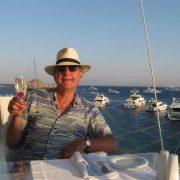How The Euro Looks From Mykonos
When I sat down at my table at the Namos Restaurant, I was somewhat puzzled by the handful of sand thrown on every table. Are the Greeks as untidy with their food service as they are with their national accounts? Namos is on the south beach of the Greek island of Mykonos, part of the Cyclades chain of ancient fable, and is said to be the hottest nightclub on the island.
 From Your Correspondent in Greece
From Your Correspondent in Greece
The reason for the sand soon became clear. Shortly thereafter, a gaggle of well-sauced, scantily dressed young ladies climbed on top of my table and started dancing. The sand was there to keep them from slipping. And I found out that the Greek meaning of ?hot? is ?loud?. When my table was cleared of dancers, my lobster dinner was delivered, and a group of partiers jumped up to take a picture of it. Welcome to the Land of Homer, Socrates, and Thucydides!
I told the waitress that she looked just like the girl on the 2,400-year-old vase in the Metropolitan Museum of Art in New York. She answered, ?It?s in my DNA.? I replied, ?I bet.? Yes, at nearly 62, I know I?m not supposed to be in places like this. But the inner me still wants to be 26.
 The Famous Lobster Dinner
The Famous Lobster Dinner
I traveled to this distant island to deliver another one of my Global Strategy Luncheons. I originally put it up in the store as a joke, thinking that no one would want to visit this bankrupt country.? There is rioting in the streets of the capital, hotels going bankrupt and keeping your deposit, credit card companies are denying charges, and Eurail has banned use of their continental passes.
To my shock and surprise, a dozen tickets sold. Several hedge fund managers from Europe planned their summer vacations around the event, bringing their families. Greece is a favorite getaway for Russian oligarchs looking to beat the Moscow heat and humidity. European Community officials in Brussels are always looking for an excuse to get out of town, at government expense. There was even a hedge fund manager from Athens who was coming off of a spectacular 2012, playing the short side in the stocks and bonds of his home country.
As we poured over our hotel menus, no one could find anything to eat. It was all some kind of weird Asian/Greek fusion. I?m talking sushi with eggplant and feta cheese. Then my Russian guest piped up, ?Why don?t we eat on my boat??, ?You can host lunch for 13 at sea, with no notice?? I asked. ?Of course!? he beamed.
 A Table for 12 Please
A Table for 12 Please
Minutes later, two launches appeared at the dockside to take my somewhat excited and expectant guests out into the Aegean Sea. The ?boat? was actually a battleship, a 150-foot long leviathan with three decks, far too large for our small harbor. A quick bridge tour displayed live satellite links, radar, GPS, and enough electronics to be the envy of the US Navy, plus a Bloomberg terminal which the Squids surely lack.
I love doing these things because I always pick up more insightful market intelligence that I am able to dish out. Before I started my presentation, we took turns going around the table, giving views on local market conditions on everything under the sun and a best shot at an outlook.
The really great discovery of the day was an explanation from my Brussels friends as to why it was impossible for the Germans to leave the European Community and the Euro (FXE), (EUO). If Germany returned to the old Deutschemark, it would overnight become the world?s strongest currency, instantly appreciating 200%-300% against what was left of the Euro. Costs for the countries companies would skyrocket.
To survive, they would have to immediately offshore as much production as possible to the lower waged United States and China. Earnings would go through the roof, but the middle class would get wiped out, especially blue-collar workers. With the jobs would go crucial market intelligence and technical innovation. The Fatherland would get hollowed out, remaining just a listing address for firms that made most of their money abroad. Sound familiar?
That means there is no choice for Germany than to continue with the political, economic, and social unification of the continent. If it has to assume the debts of the precarious southern European countries, it is a bargain at the price.
This is easier said that done. The United States offers no real example. The founding fathers were all white, protestant males from identical cultural backgrounds who spoke the same language and accounted for just 5% of the population. Interstate communication took place via horse and rider, and it took three weeks for a message to get from one end of the country to another.
They eventually huddled together in a hot, steamy room in Philadelphia for months in 1776, and didn?t come out until they created a country (you can see a picture of the edifice on the back of a $100 bill).
Few know that a major impetus for the American Revolution was so American debtors could default on burdensome loans to London banks (again, sound familiar?)
Even then, with minimal military experience among them (George Washington had just three years service in what was then the equivalent of the National Guard, and could qualify for a commission in the British Army) there was less than a 5% chance of the nascent government taking on the combined British Army and Navy and winning. The creation of the US is really an historical accident of the 18th century, and couldn?t be repeated today, even in the US.
Switzerland offers a possible pathway for a European future. There, mutually distrustful and suspicious German, French, Italian, and even Latin speaking cantons eventually worked out a loose confederation. But it took 100 years to accomplish. Financial markets won?t be as patient today.
As the lunch wound down, two leggy blondes appeared at our table with two trays of vodka filled shot glasses. Our host toasted The Mad Hedge Fund Trader enterprise, as well as our future success in the markets. I said ?thank you? with a hearty ?nastrovia,? and the launches ferried is back to shore.
The rest of my week in Mykonos was pretty relaxed. I got up at 6:00 am every morning to check the markets, read my email, and to write. By 2:00 pm I was safely in a beach chair, observing the local wildlife, and frequently taking dips in a turquois blue sea.
In a globalized world, the beach attendants in Greece speak English, Italian, and Russian, reflecting the current makeup of the tourist population. The Africans hawking fake Gucci?s and Rolexes are Tanzanian. The young men and women who wander beach chair to beach chair offering cheap massages are all Chinese.
The American and German students who overran the place when I first came here 45 years ago are largely absent. The Yanks are too broke, and the Germans are all visiting America, which is far cheaper and lacking the prejudice they run into here. Creditors are never popular.
Sticking out like a sore thumb were three senior Chinese strolling the beach wearing white bathrobes. It turns out they were working in Athens to soak up billions in high yield Greek debt on behalf of the Bank of China. They thought Mykonos would make an exotic weekend away from the polluted and tumultuous capital.
One day, my frolicking in the waters earned me a coral cut on my foot. Left untreated, these things can infect very rapidly. So I went to the mini market and bought a half bottle of The Famous Grouse Scotch Whiskey. I poured a small amount on the open sore, and drank the rest. It works every time.
Taking a break from my writing, I explored the medieval downtown of Mykonos, a warren of narrow twisting alleyways squeezed between whitewashed stucco buildings. This was originally a lair for pirates who preyed on Mediterranean shipping 500 years ago.
Today, pirates of a more modern variety storm ashore. Hedge fund managers wielding American Express platinum credit cards disembark from the flotilla of private yachts. The top designer brands are well represented here, and they do a brisk business.
They then retire to the old Venetian quarter for a dinner of moussaka and baklava, to be washed down by local ?Fix? beer. Greek wines have improved a lot in recent decades, and there is a lot to be said for a fine Peloponnesian Chardonnay.
My only near death experience on this leg of the trip was the dubious quadracycle I rented. Apparently, the skills of Greek mechanics leave a lot to be desired, as the rickety machine burned oil, had lousy brakes, and spewed out a plume of noxious, blue smoke. After a few hair-raising hours on the island?s narrow, dilapidated roads facing suicidal, curve passing drivers, I happily returned my ride early.
Testing the skills of the Greek medical community as well was not on my agenda.
Life is good.








